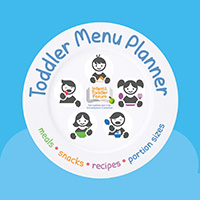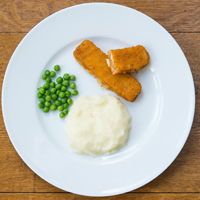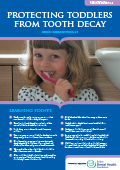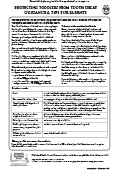
Use our Toddler Meal planning tool to ensure your 1-4 years old receives a balanced diet every day.
Find out more >
Use our toddler food tracker to check that your 1-4 year olds are getting a good balance of foods and activity
Find out more >
This educational programme for frontline professionals contains a range of practical resources on infant feeding.
Find out more >Guidance & Tips for Parents
Start regular effective tooth brushing to remove plaque
Start brushing your baby’s teeth as soon as they erupt and register him or her with a dentist.
An easy way to brush your child’s teeth is from behind. Comfortable and safe positions for your toddler can be on your knee, sitting on a changing mat, in a high chair or in a pram or buggy.
As more teeth come through, develop a system of cleaning them that ensures all surfaces are brushed thoroughly twice each day.
Toddlers should be encouraged to enjoy brushing their own teeth, but children should be supervised until at least seven years and always taught to ‘spit don’t rinse’, because excessive rinsing with water after brushing removes the benefit of fluoride.
Use Fluoride toothpaste to strengthen tooth enamel
Brush teeth twice a day with a small soft dry brush using a toothpaste containing fluoride
- up to the age of three use a smear of toothpaste containing 1000ppm of fluoride
- over the age of three use a pea sized amount of toothpaste containing 1350-1500ppm of fluoride
Avoid sweet drinks – especially in a bottle
It’s best to avoid sweet drinks including fruit juices and smoothies. If used, dilute them very well and serve only with meals and in a cup/glass not a bottle. Regularly sucking on sweet drinks in a bottle is very, very likely to cause tooth decay as the teeth are bathed in sugar and acid over a long period of time.
Never leave a bottle of milk or a sweet drink with your toddler when you put him or her down to sleep.
Begin using a cup or free-flow beaker for milk and water drinks from about six months or so, and stop using bottles around 12 months.
Water or milk are safe drinks between meals and snacks. Give only water at night to toddlers.
Limit foods containing sugar to four times a day, e.g. at the three meals and no more than one snack.
Only offer your toddler food at three meals and two to three snacks each day. Do not allow grazing on food throughout the day as this can cause tooth decay.
If your child uses a pacifier, soother or dummy make sure it is an orthodontic dummy and never dip it in anything sweet.
Nutritious Snacks
| Fruit | mouth-sized chunks, cubes or slices of apple, pear, satsuma, orange, banana, kiwi, melon, strawberries, sliced grapes, peaches and plums
|
| Raw vegetable sticks or slices | carrot, pepper, celery, cucumber, sliced cherry tomato, radish, broccoli
|
| Toast, breads, rolls, baps, bread sticks, plain buns |
French bread with a small amount of butter or spread; mini savoury sandwiches with marmite, cheese, tuna, banana, salad or thin slices of meat; pita bread pockets cut into small slices or toasted with or without butter or spread e.g. olive or sunflower oil spread; breadsticks on their own or with a dip or soft cheese
|
| Oatcakes, rice cakes, crackers, crispbreads, melba toast |
plain or with butter or spread e.g. olive oil or sunflower oil spread, or use a savoury spread, such as marmite or peanut butter |
| Natural yogurt or fromage frais | on its own or as a dip or with fruit
|
| Muffins, plain, potato or cheese scones, crumpets, pancakes |
on their own or with a small amount of butter or spread |
| Wholegrain breakfast cereals, but not cereal bars | serve with milk and fresh fruit |
Where possible use a sugar-free medicine
If your child is prescribed a medicine, ensure that it is a sugar-free (SF) medicine if possible. If there is no sugar-free option give the medicine at meal times.




